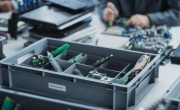Oxford trial turns plastic waste to hydrogen fuel
Academics from the Universities of Oxford and Cardiff are working alongside CarbonMeta Technologies to turn plastic waste into clean hydrogen fuel and high-value carbon nanomaterials.
 Using ‘microwave catalysis’ technology – custom-designed microwave machines – from the University of Oxford, CarbonMeta hopes to yield ‘high value products for industry’ – graphite (600 GBP per tonne), hydrogen (3,500 GBP per tonne), graphene (100,000 GBP per tonne), and carbon nanotubes (100,000 GBP per tonne).
Using ‘microwave catalysis’ technology – custom-designed microwave machines – from the University of Oxford, CarbonMeta hopes to yield ‘high value products for industry’ – graphite (600 GBP per tonne), hydrogen (3,500 GBP per tonne), graphene (100,000 GBP per tonne), and carbon nanotubes (100,000 GBP per tonne).
Transforming one tonne of plastic using the microwave machines can take on average two hours, with the material reaching up to 600 degrees.
The firm is currently in discussion with investors in North Carolina to build a plant with the capacity to process 20 metric tonnes per day. According to CabonMeta, the operation of the scale will take 18 to 24 months to be functional, but it is ‘confident’ that it can scale ‘up to one tonne per day in as little as nine months’.
Upcycling plastic and construction waste to help address the world’s pollution and climate crises is a main aim for the company. Using its technology, CarbonMeta will be able to support the transition to two major sources of sustainable energy – hydrogen for transport or to heat homes and batteries for electric vehicles.
The business is based in Woodinville, Washington and is developing a ‘global reach predominantly based on British innovation’.
Microwave catalysts
The catalyst, made from iron and aluminium due to their affordability, was developed by Peter Edwards' team at Oxford University. At ‘milder conditions’ – 600 degrees centigrade and at standard air pressure – it speeds up the rate of separation of hydrogen and carbon from any hydrocarbon (plastics, waxes, agricultural waste and food wastes).
When these hydrocarbons are processed with microwave radiation, the catalyst absorbs radiation and focuses that radiation on the carbon-hydrogen bonds that hold the hydrocarbons together.
After the carbon-hydrogen bonds become unstable, the hydrogen is released as a gas and the carbon remains behind in solid form. Most of the time, the carbon is in the form of “amorphous carbon”, sometimes in the form of graphite, and less often in the form of graphene and carbon nanotubes.
Future partnerships
CarbonMeta is currently building commercial partnerships to up-scale the microwave catalyst technology, including global multi-energy providers in Europe.
The company's latest initiative is an assessment project in Spain, which will analyse how different combinations of mixed plastics waste perform in the new process and how to generate the most substantial yields. The results of the European project will be published in Autumn of 2022.
Behind the process is Oxford don Professor Peter Edwards, who has conducted over ten decades of research in environmentally focused chemistry. His other work includes using carbon dioxide to create aviation fuel, as well as extracting green hydrogen from fossil fuels. Peter was elected a Fellow of the Royal Society in 1996.
Lloyd Spencer, CEO of CarbonMeta Technologies, said: “Our project in Spain is the first step on the road to fully commercialising what is a breakthrough technology.
“While a big part of sorting out plastic pollution is simply to stop producing so much plastic, we still need a sustainable process for dealing with what is still manufactured.
“With US entrepreneurship and investment, British research and European business support, this method of making something clean and useful out of problem plastic has potential global reach.”
Professor Peter Edwards added: “This is a ground-breaking solution to the global challenge of plastics waste. It is thrilling for myself and my colleagues to see this technology move out of the limited capacity of a chemistry lab into testing on a genuinely commercial scale.”






